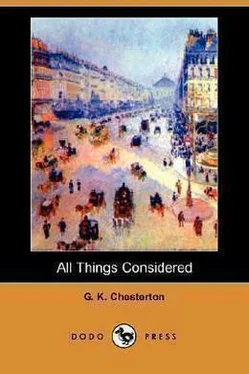The reports of the debates in the Houses of Parliament are constantly growing smaller and smaller in our newspapers. Perhaps this is partly because the speeches are growing duller and duller. I think in some degree the two things act and re–act on each other. For fear of the newspapers politicians are dull, and at last they are too dull even for the newspapers. The speeches in our time are more careful and elaborate, because they are meant to be read, and not to be heard. And exactly because they are more careful and elaborate, they are not so likely to be worthy of a careful and elaborate report. They are not interesting enough. So the moral cowardice of modern politicians has, after all, some punishment attached to it by the silent anger of heaven. Precisely because our political speeches are meant to be reported, they are not worth reporting. Precisely because they are carefully designed to be read, nobody reads them.
Thus we may concede that politicians have done something towards degrading journalism. It was not entirely done by us, the journalists. But most of it was. It was mostly the fruit of our first and most natural sin—the habit of regarding ourselves as conjurers rather than priests, for the definition is that a conjurer is apart from his audience, while a priest is a part of his. The conjurer despises his congregation; if the priest despises any one, it must be himself. The curse of all journalism, but especially of that yellow journalism which is the shame of our profession, is that we think ourselves cleverer than the people for whom we write, whereas, in fact, we are generally even stupider. But this insolence has its Nemesis; and that Nemesis is well illustrated in this matter of reporting.
For the journalist, having grown accustomed to talking down to the public, commonly talks too low at last, and becomes merely barbaric and unintelligible. By his very efforts to be obvious he becomes obscure. This just punishment may specially be noticed in the case of those staggering and staring headlines which American journalism introduced and which some English journalism imitates. I once saw a headline in a London paper which ran simply thus: "Dobbin's Little Mary." This was intended to be familiar and popular, and therefore, presumably, lucid. But it was some time before I realised, after reading about half the printed matter underneath, that it had something to do with the proper feeding of horses. At first sight, I took it, as the historical leader of the future will certainly take it, as containing some allusion to the little daughter who so monopolised the affections of the Major at the end of "Vanity Fair." The Americans carry to an even wilder extreme this darkness by excess of light. You may find a column in an American paper headed "Poet Brown Off Orange–flowers," or "Senator Robinson Shoehorns Hats Now," and it may be quite a long time before the full meaning breaks upon you: it has not broken upon me yet.
And something of this intellectual vengeance pursues also those who adopt the modern method of reporting speeches. They also become mystical, simply by trying to be vulgar. They also are condemned to be always trying to write like George R. Sims, and succeeding, in spite of themselves, in writing like Maeterlinck. That combination of words which I have quoted from an alleged speech of Mr. Bernard Shaw's was written down by the reporter with the idea that he was being particularly plain and democratic. But, as a matter of fact, if there is any connection between the two sentences, it must be something as dark as the deepest roots of Browning, or something as invisible as the most airy filaments of Meredith. To be simple and to be democratic are two very honourable and austere achievements; and it is not given to all the snobs and self–seekers to achieve them. High above even Maeterlinck or Meredith stand those, like Homer and Milton, whom no one can misunderstand. And Homer and Milton are not only better poets than Browning (great as he was), but they would also have been very much better journalists than the young men on the Daily Mail .
As it is, however, this misrepresentation of speeches is only a part of a vast journalistic misrepresentation of all life as it is. Journalism is popular, but it is popular mainly as fiction. Life is one world, and life seen in the newspapers another; the public enjoys both, but it is more or less conscious of the difference. People do not believe, for instance, that the debates in the House of Commons are as dramatic as they appear in the daily papers. If they did they would go, not to the daily paper, but to the House of Commons. The galleries would be crowded every night as they were in the French Revolution; for instead of seeing a printed story for a penny they would be seeing an acted drama for nothing. But the, people know in their hearts that journalism is a conventional art like any other, that it selects, heightens, and falsifies. Only its Nemesis is the same as that of other arts: if it loses all care for truth it loses all form likewise. The modern who paints too cleverly produces a picture of a cow which might be the earthquake at San Francisco. And the journalist who reports a speech too cleverly makes it mean nothing at all.
The Worship of the Wealthy
There has crept, I notice, into our literature and journalism a new way of flattering the wealthy and the great. In more straightforward times flattery itself was more straight–forward; falsehood itself was more true. A poor man wishing to please a rich man simply said that he was the wisest, bravest, tallest, strongest, most benevolent and most beautiful of mankind; and as even the rich man probably knew that he wasn't that, the thing did the less harm. When courtiers sang the praises of a King they attributed to him things that were entirely improbable, as that he resembled the sun at noonday, that they had to shade their eyes when he entered the room, that his people could not breathe without him, or that he had with his single sword conquered Europe, Asia, Africa, and America. The safety of this method was its artificiality; between the King and his public image there was really no relation. But the moderns have invented a much subtler and more poisonous kind of eulogy. The modern method is to take the prince or rich man, to give a credible picture of his type of personality, as that he is business–like, or a sportsman, or fond of art, or convivial, or reserved; and then enormously exaggerate the value and importance of these natural qualities. Those who praise Mr. Carnegie do not say that he is as wise as Solomon and as brave as Mars; I wish they did. It would be the next most honest thing to giving their real reason for praising him, which is simply that he has money. The journalists who write about Mr. Pierpont Morgan do not say that he is as beautiful as Apollo; I wish they did. What they do is to take the rich man's superficial life and manner, clothes, hobbies, love of cats, dislike of doctors, or what not; and then with the assistance of this realism make the man out to be a prophet and a saviour of his kind, whereas he is merely a private and stupid man who happens to like cats or to dislike doctors. The old flatterer took for granted that the King was an ordinary man, and set to work to make him out extraordinary. The newer and cleverer flatterer takes for granted that he is extraordinary, and that therefore even ordinary things about him will be of interest.
I have noticed one very amusing way in which this is done. I notice the method applied to about six of the wealthiest men in England in a book of interviews published by an able and well–known journalist. The flatterer contrives to combine strict truth of fact with a vast atmosphere of awe and mystery by the simple operation of dealing almost entirely in negatives. Suppose you are writing a sympathetic study of Mr. Pierpont Morgan. Perhaps there is not much to say about what he does think, or like, or admire; but you can suggest whole vistas of his taste and philosophy by talking a great deal about what he does not think, or like, or admire. You say of him—"But little attracted to the most recent schools of German philosophy, he stands almost as resolutely aloof from the tendencies of transcendental Pantheism as from the narrower ecstasies of Neo–Catholicism." Or suppose I am called upon to praise the charwoman who has just come into my house, and who certainly deserves it much more. I say—"It would be a mistake to class Mrs. Higgs among the followers of Loisy; her position is in many ways different; nor is she wholly to be identified with the concrete Hebraism of Harnack." It is a splendid method, as it gives the flatterer an opportunity of talking about something else besides the subject of the flattery, and it gives the subject of the flattery a rich, if somewhat bewildered, mental glow, as of one who has somehow gone through agonies of philosophical choice of which he was previously unaware. It is a splendid method; but I wish it were applied sometimes to charwomen rather than only to millionaires.
Читать дальше








